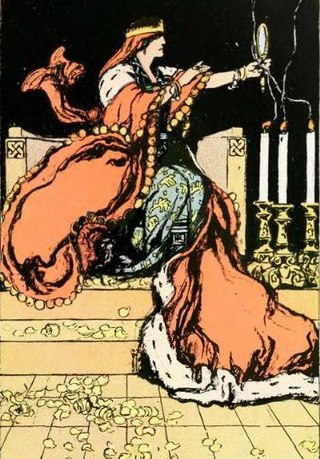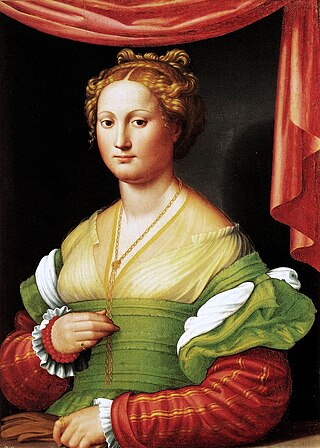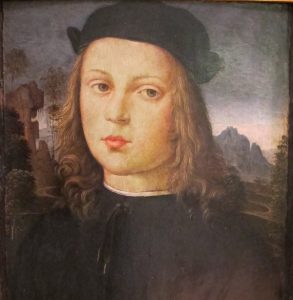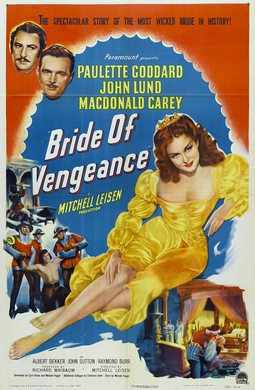
Cesare Borgia was an Italian cardinal and condottiero, an illegitimate son of Pope Alexander VI and member of the Spanish-Aragonese House of Borgia. His fight for power was a major inspiration for The Prince by Niccolò Machiavelli.

Lucrezia Borgia was an Italian noblewoman of the House of Borgia who was the illegitimate daughter of Pope Alexander VI and Vannozza dei Cattanei. She reigned as the governor of Spoleto, in her own right, a position usually held by Cardinals.

The House of Borgia was a Spanish noble family, which rose to prominence during the Italian Renaissance. They were from Xàtiva, Kingdom of Valencia, the surname being a toponymic from the town of Borja, then in the Crown of Aragon, in Spain.

The Evil Queen, also called the Wicked Queen or just the Queen, is a fictional character and the main antagonist of "Snow White", a German fairy tale recorded by the Brothers Grimm; similar stories exist worldwide. Other versions of the Queen appear in subsequent adaptations and continuations of the fairy tale, including novels and films. A particularly notable version is Disney's depiction, sometimes known as Queen Grimhilde. The character has also become an archetype that inspired unrelated works.

Giovanna "Vannozza" (dei) Cattanei was an Italian woman who was the chief mistress of Cardinal Rodrigo de Borgia, later to become Pope Alexander VI.

The Family is a 2001 novel written by Mario Puzo. The novel is about Pope Alexander VI and his family. Puzo spent over twenty years working on the book off and on, while he wrote others. The novel was finished by his longtime girlfriend, Carol Gino. The Family is effectively his last novel, but released two years after his death.

Caterina Sforza was an Italian noblewoman, the Countess of Forlì and Lady of Imola, firstly with her husband Girolamo Riario, and after his death as a regent of her son Ottaviano.

Prince of Foxes is a 1947 historical novel by Samuel Shellabarger, following the adventures of the fictional Andrea Orsini, a captain in the service of Cesare Borgia during his conquest of the Romagna.

Ercole II d'Este was Duke of Ferrara, Modena and Reggio from 1534 to 1559. He was the eldest son of Alfonso I d'Este and Lucrezia Borgia.
Giovanni Borgia, known as the Infans Romanus, was born into the House of Borgia in secret and is of unclear parentage. Speculations of the child's parentage involve either Lucrezia Borgia with her alleged lover, Perotto Calderon or Cesare Borgia, or Pope Alexander VI as his father. Cesare Borgia's biographer Rafael Sabatini says that the truth is fairly clear: Alexander fathered the child with an unknown Roman woman.

Alfonso of Aragon, Duke of Bisceglie and Prince of Salerno of the House of Trastámara, was the illegitimate son of Alfonso II King of Naples and his mistress Trogia Gazzella. His father, cousin of King Ferdinand II of Aragon, abdicated in favour of his legitimate son Ferdinand II of Naples.

Sancha of Aragon, or Sancia of Aragon, was an illegitimate daughter of King Alfonso II of Naples and his mistress Trogia Gazzella. In 1494, she was married to Gioffre Borgia, youngest son of Pope Alexander VI. Upon her marriage, she and her husband were created Prince and Princess of Squillace, a province in the south of Italy. For the majority of their marriage, Sancha and her husband lived in the Vatican with the rest of his family. There Sancha became friends with her sister-in-law Lucrezia, and allegedly had affairs with both of her husband's older brothers: Juan Borgia, 2nd Duke of Gandia, also known as Giovanni Borgia, and Cesare Borgia. Her affair with Juan is sometimes said to be the reason for Cesare's alleged murder of Juan in 1497.

Prince of Foxes is a 1949 American historical adventure film adapted from Samuel Shellabarger's novel Prince of Foxes. The movie starred Tyrone Power as Orsini and Orson Welles as Cesare Borgia. It was nominated for two Oscars during the 22nd Academy Awards: Best Black and White Cinematography and Best Costume Design, Black and White.

Bride of Vengeance is a 1949 American historical drama film directed by Mitchell Leisen and starring Paulette Goddard, John Lund and Macdonald Carey. Produced and distributed by Paramount Pictures, it is set in the Italian Renaissance era. Ray Milland was originally cast in the film but refused the assignment, leading the studio to suspend him for ten weeks.

The Borgias is a historical drama television series created by Neil Jordan; it debuted in 2011 and was canceled in 2013.

Holliday Clark Grainger, also credited as Holly Grainger, is an English screen and stage actress. Some of her prominent roles are Kate Beckett in the BAFTA award-winning children's series Roger and the Rottentrolls, Lucrezia Borgia in the Showtime series The Borgias, Robin Ellacott in the Strike series, DI Rachel Carey in the Peacock/BBC One crime drama The Capture and Estella in Mike Newell's adaptation of Great Expectations.
Roberta Leah Jacobs Gellis was an American writer of historical fiction, historical romance, and fantasy. She held master's degrees in both biochemistry and medieval literature.
"The Confession" is the final episode of the second season of Showtime-Bravo! historical drama The Borgias. It was written by Guy Burt and directed by David Leland. It originally aired on June 17, 2012.
Angela Borgia or Borja, was an Italian noblewoman.

Spinning is a graphic novel memoir by cartoonist Tillie Walden that was first published by First Second Books on September 12, 2017. The memoir chronicles Walden's years coming-of-age as a competitive figure skater, as she navigates romance, bullying and various traumas. It won the 2018 Eisner Award for Best Reality-Based Work.
















